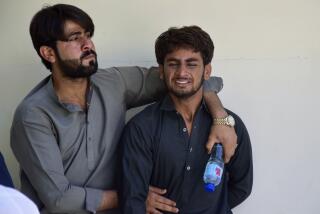21 Dead in Pakistan Mosque Attack as Tensions Mount
- Share via
NEW DELHI — The death toll continued to rise Monday from the murderous rivalry between two Muslim sects in Pakistan as masked gunmen opened fire on worshipers at a Sunni mosque, slaying at least 21 people, many of them praying boys from a religious school.
The blood bath in Multan, a city in the eastern province of Punjab, came one day after the killing of a leader of the minority Shiite sect in a town 60 miles to the south.
Infuriated by the attack on their sanctuary, Sunnis in Multan came out in the streets to stone Shiite neighborhoods, shout anti-Shiite slogans and block roads with burning tires, witnesses said.
The back-to-back incidents highlighted the increasingly hostile relations between militants of the two rival branches of Islam in a country founded nearly half a century ago so the subcontinent’s Muslims would have a state of their own.
Elsewhere in Pakistan, in the town of Larkana, ancestral home of the family of Prime Minister Benazir Bhutto, police battled followers of her estranged brother and political rival, Murtaza, who was slain by police in Karachi on Friday in murky circumstances.
Some commentators predicted that Murtaza Bhutto’s death would further erode the mandate of his sister, whose leadership of Pakistan since 1993 has been marked by a sharp downturn in the economy and increasing lawlessness in much of the country.
Witnesses said early morning prayers had just started at Multan’s Masjid Al Khair when the armed men invaded the mosque and sprayed the worshipers with submachine-gun fire. The gunmen, said to number four, managed to escape.
All of the victims were Sunnis, the majority denomination in Pakistan. According to hospital officials, many of the slain worshipers were students, ages 10 to 16, from the religious school next to the mosque. At least 33 people were wounded in the fusillade, many of them seriously, and the death toll was expected to rise.
The matting where the Sunnis had been praying was soaked with blood. The dead, their faces covered with cloths, were wheeled away in handcarts. Friends and survivors sobbed at the sight.
There was no immediate claim of responsibility, but authorities said they believed the attack was in retaliation for the murder of the Shiite leader in Bawahalpur the previous day.
Since August, tit-for-tat attacks between Sunnis and Shiites have occurred in Punjab, in the port city of Karachi on the Arabian Sea and in the lawless North-West Frontier Province, where the deadliest streak of violence occurred: More than 100 people were killed in running battles there earlier this month, and the army was brought in to restore order.
To prevent further sectarian clashes in Multan, a city of more than half a million people, police and paramilitary troops were called out by the hundreds to patrol the streets in jeeps and armored personnel carriers. Civilians stayed in their homes, and shopkeepers pulled down their metal shutters.
Although Sunnis and Shiites follow the Koran and concur on the Five Pillars of Islam, they disagree on historical and political matters stemming from the early period of their faith, particularly over the role of the Prophet Muhammad’s successors.
In Larkana on Monday, witnesses told reporters that two people were wounded when police fired bullets and tear gas to disperse several hundred protesters on the last day of official mourning for Murtaza Bhutto.
The slain leader’s political faction, in a statement, accused Karachi police of shooting him and seven of his followers dead in an ambush. Police claimed they fired in self-defense after Murtaza Bhutto’s bodyguards began shooting to prevent officers from checking their motorcade and its occupants. But opposition Pakistani politicians and newspapers criticized police for being trigger-happy.
At the funeral Saturday, angry supporters of Murtaza squarely blamed his sister for his death, chanting “Benazir is a killer” and vowing to take revenge.
More to Read
Sign up for Essential California
The most important California stories and recommendations in your inbox every morning.
You may occasionally receive promotional content from the Los Angeles Times.













